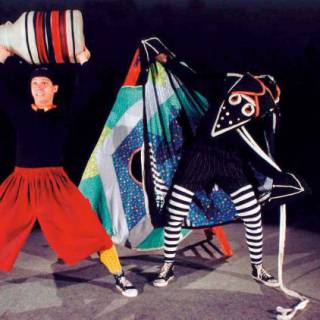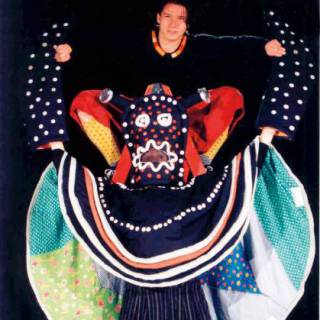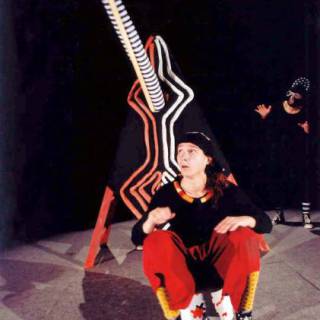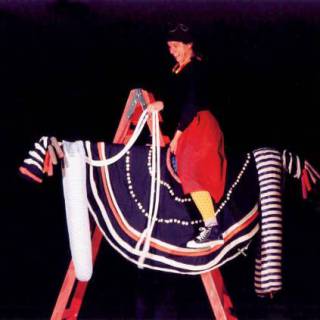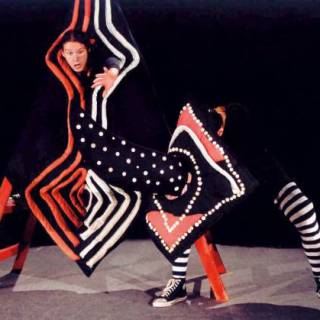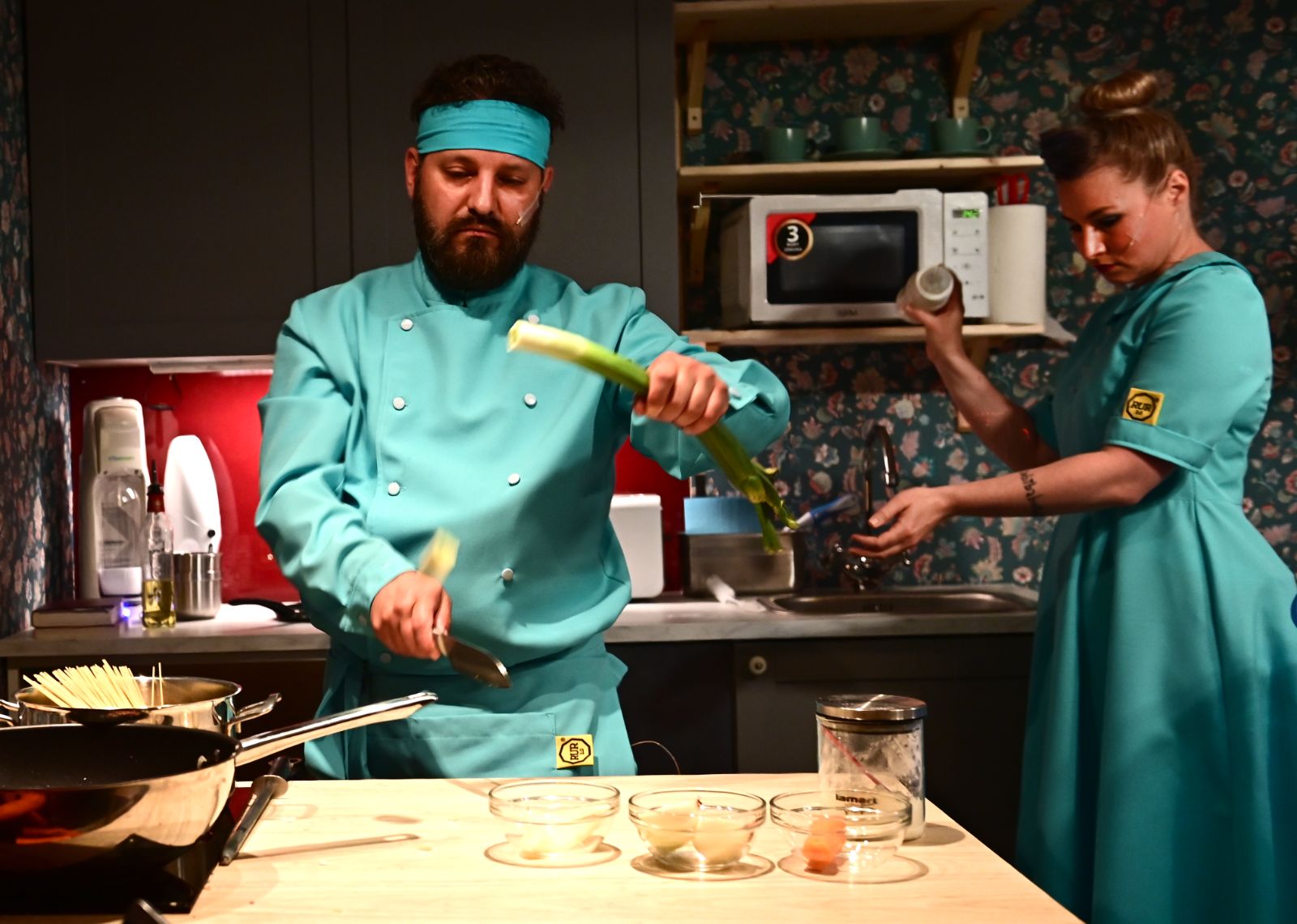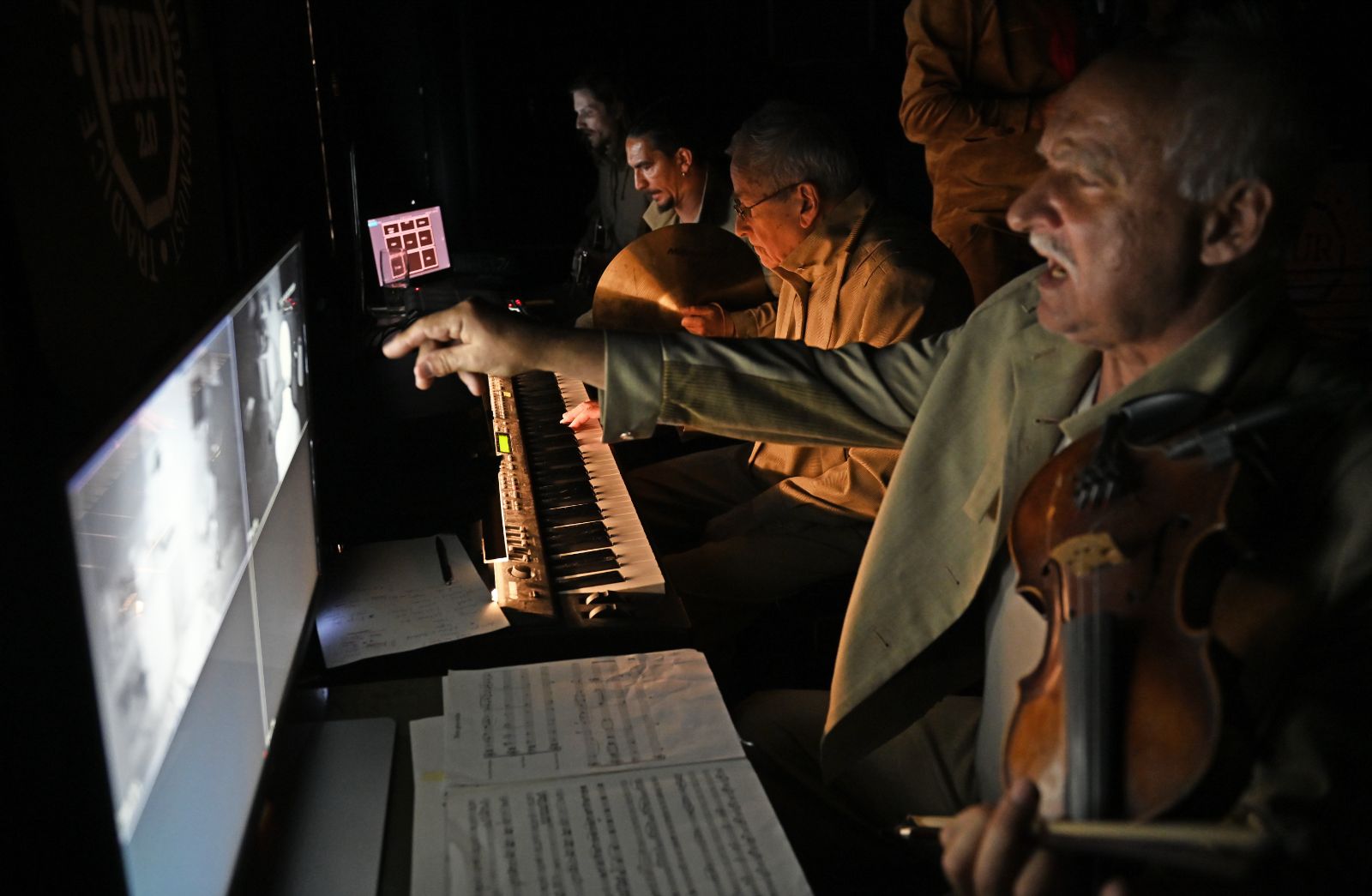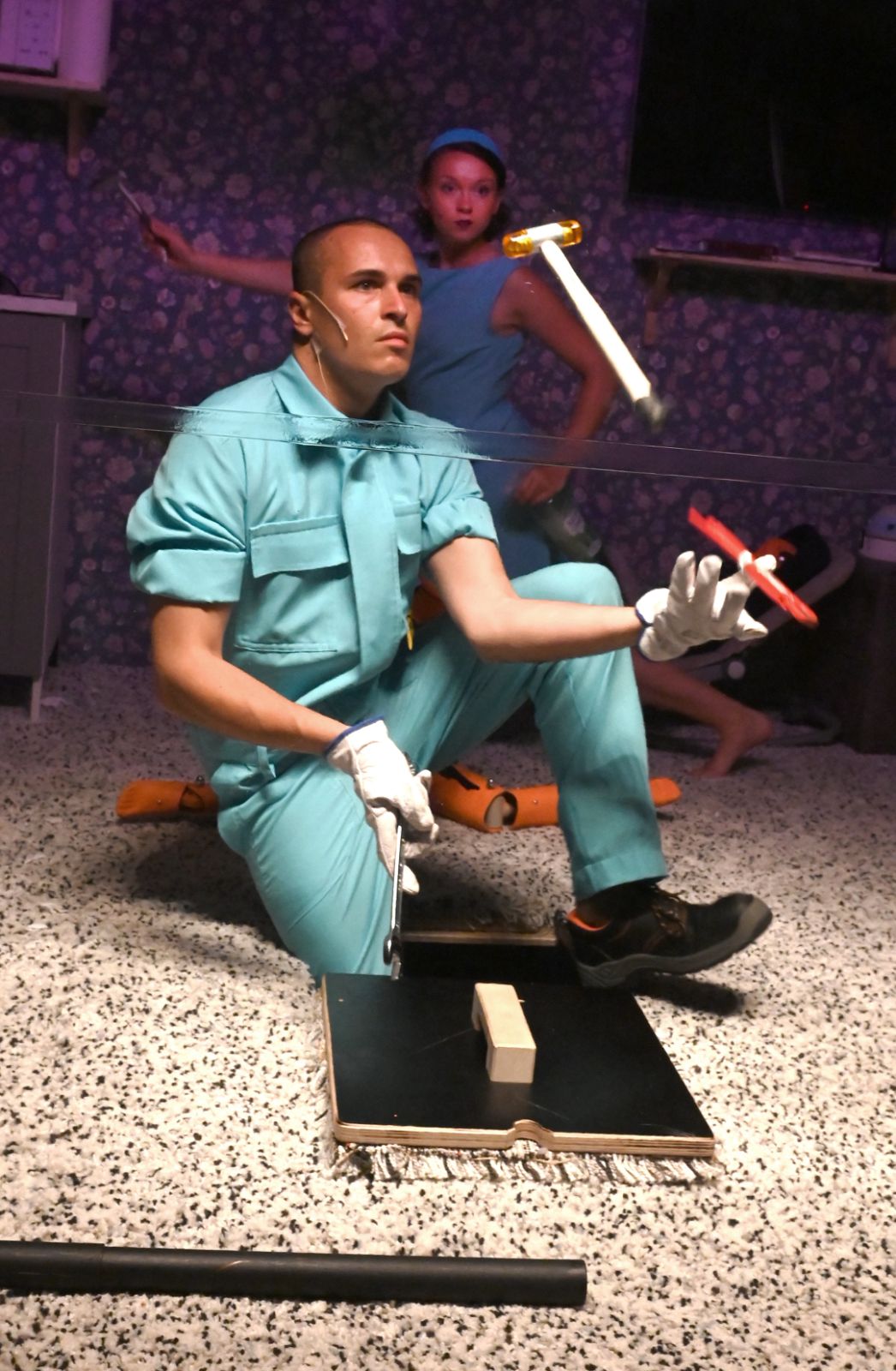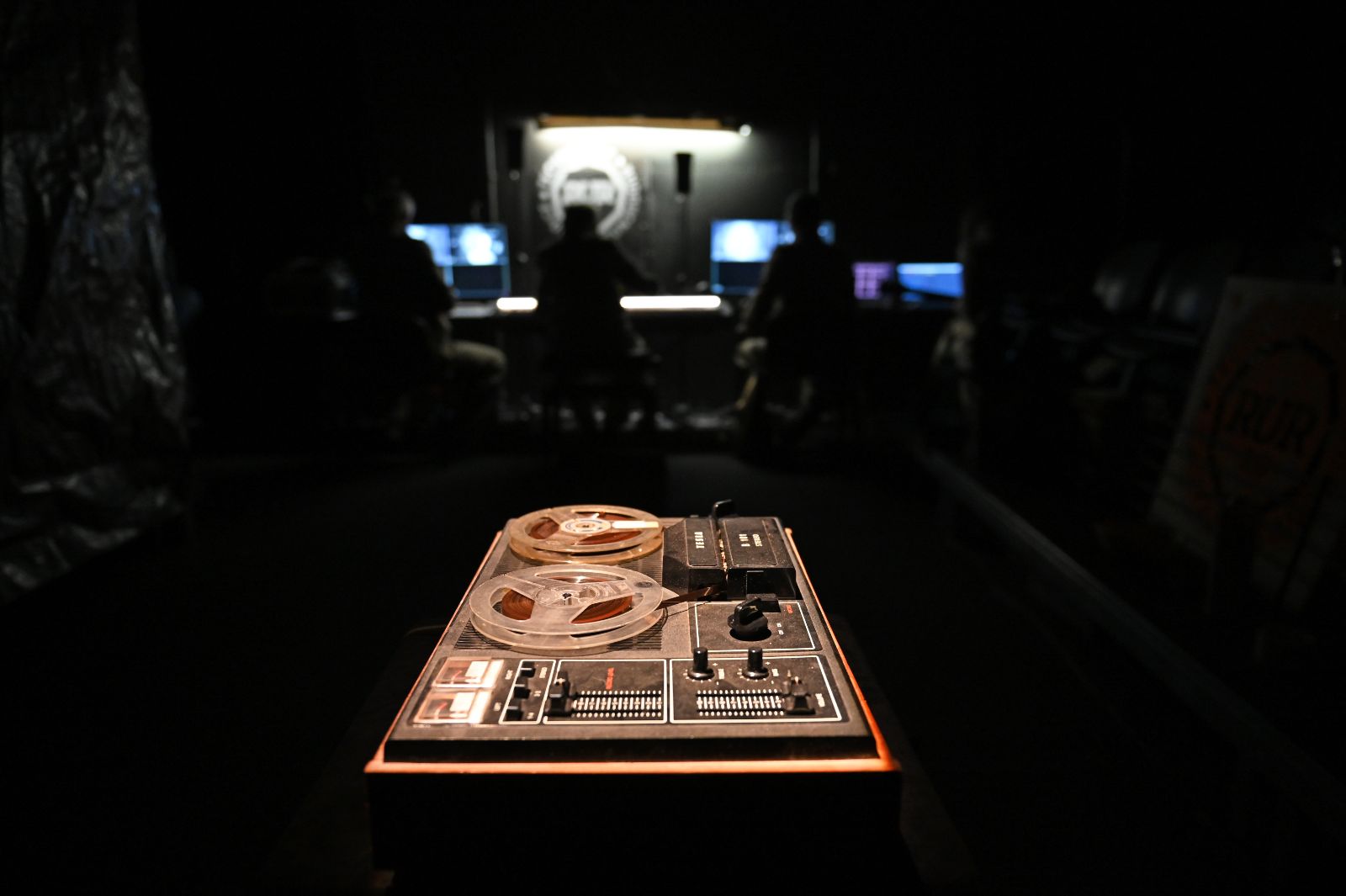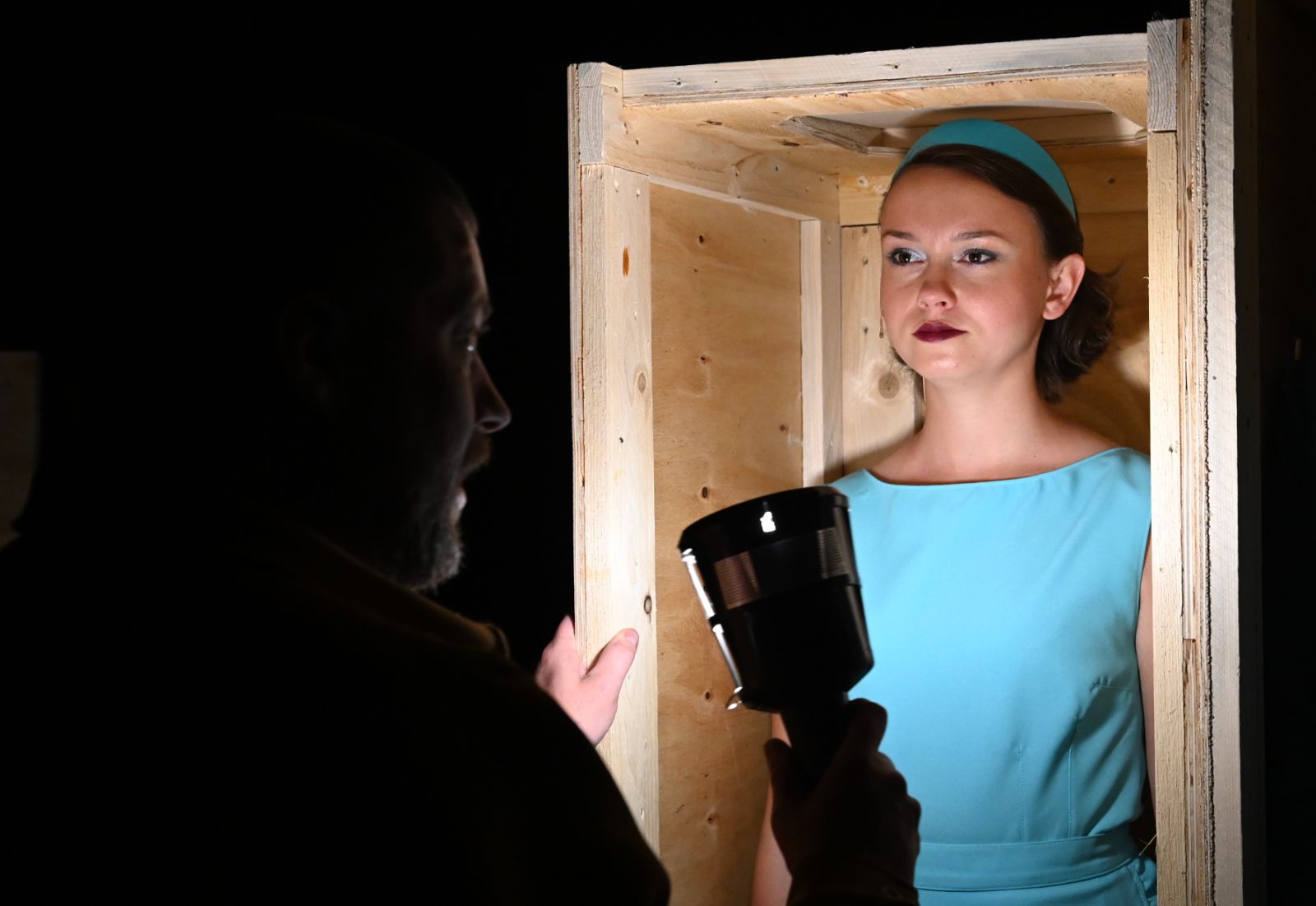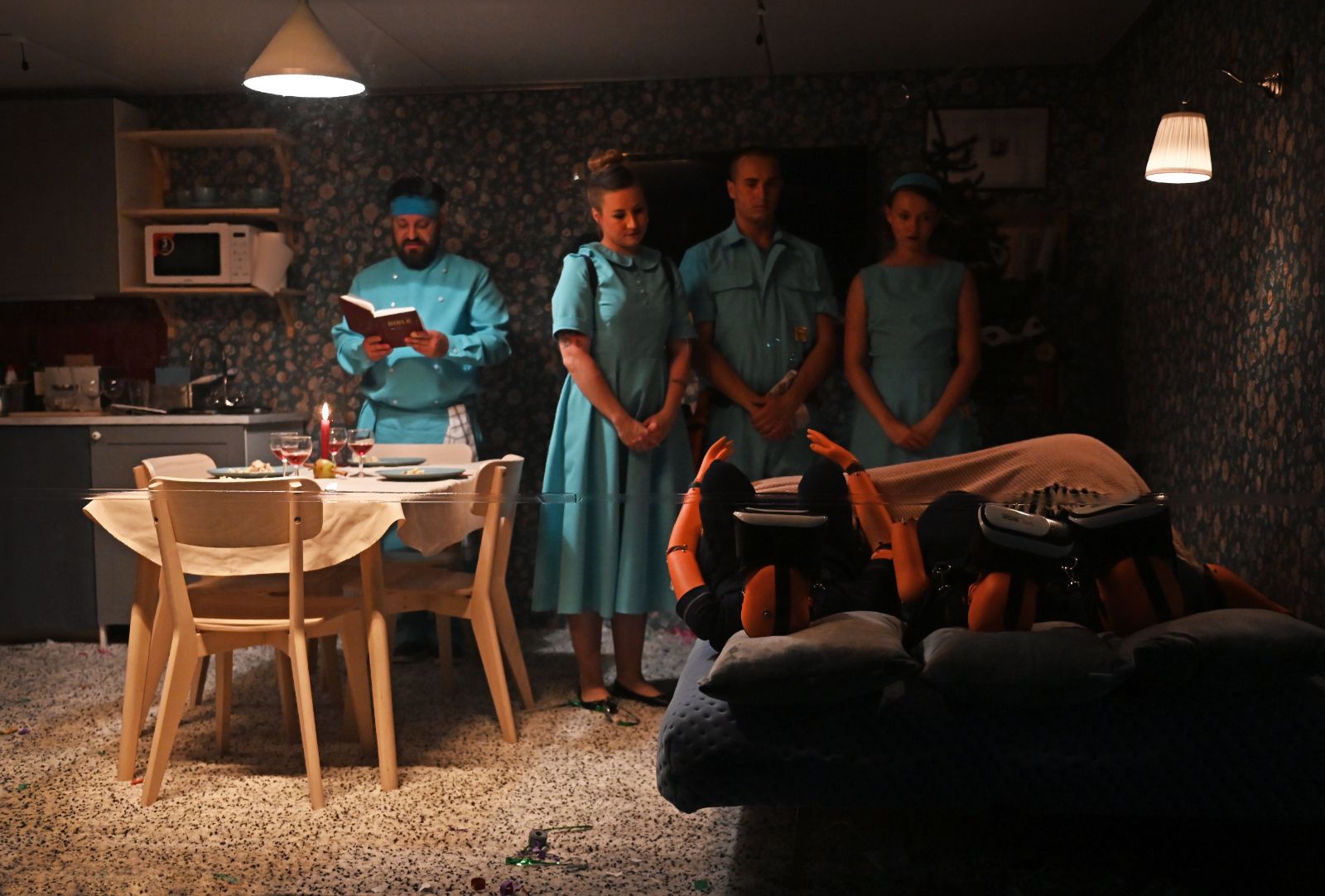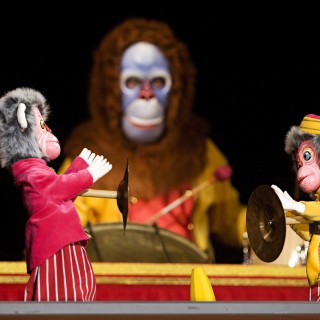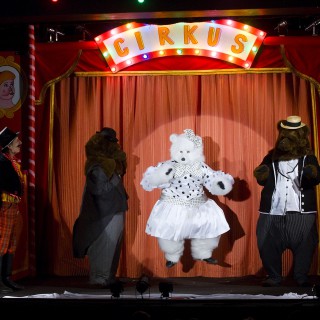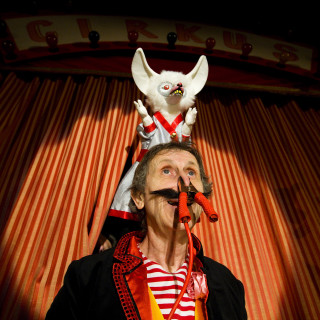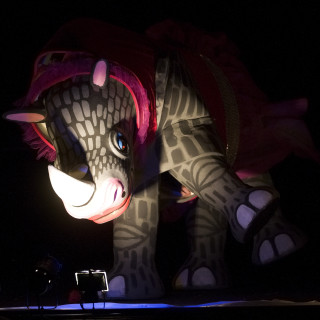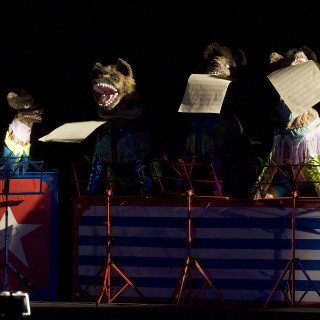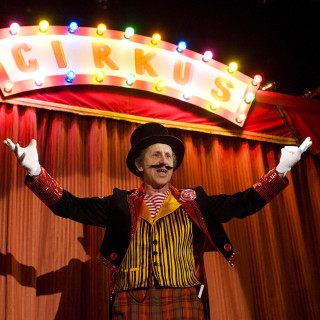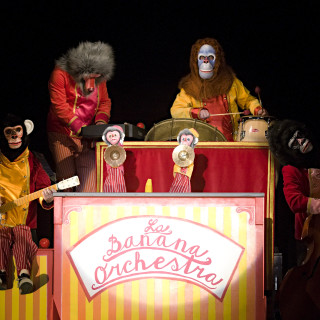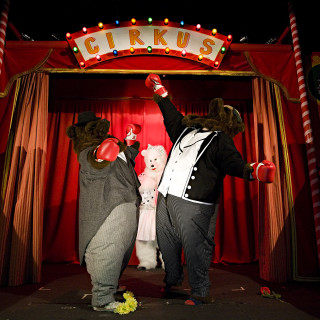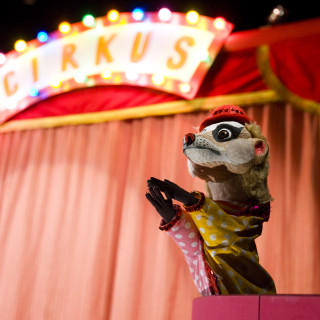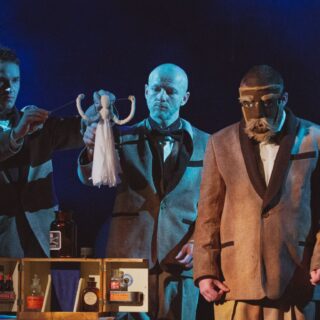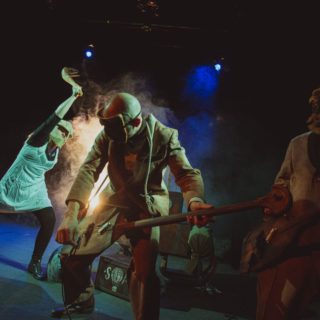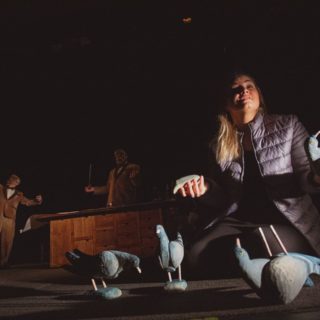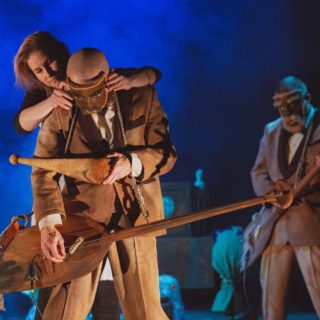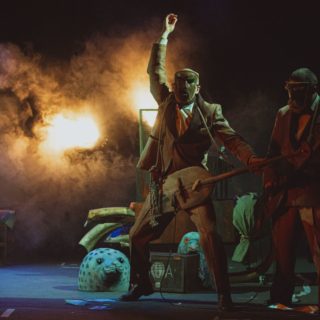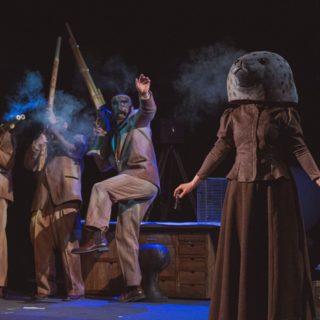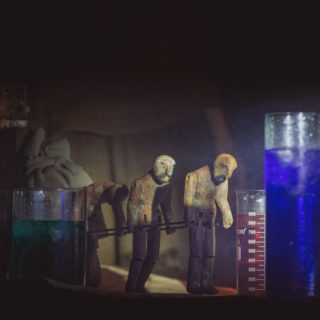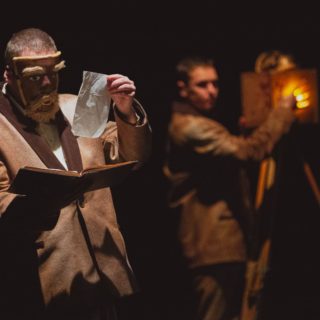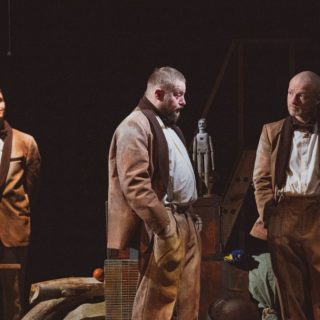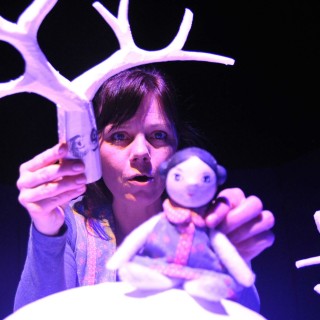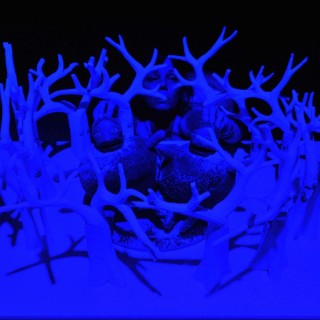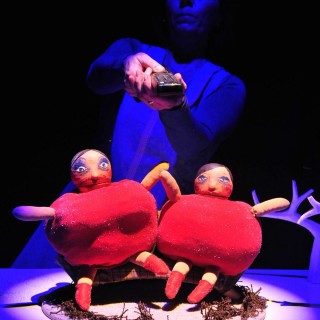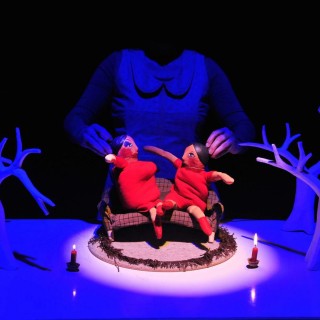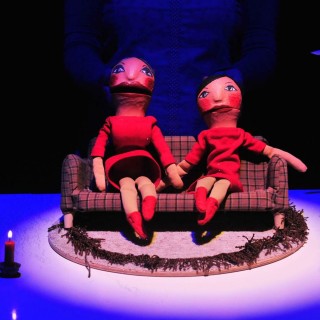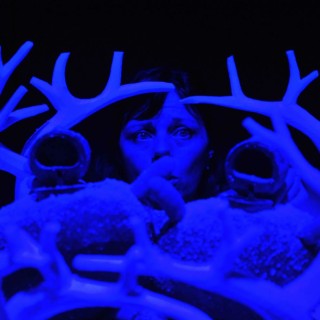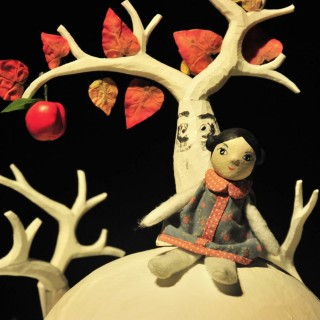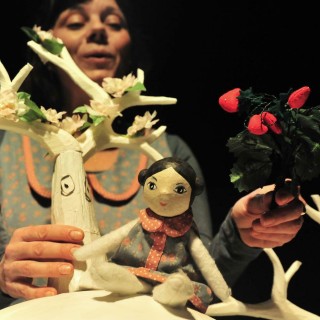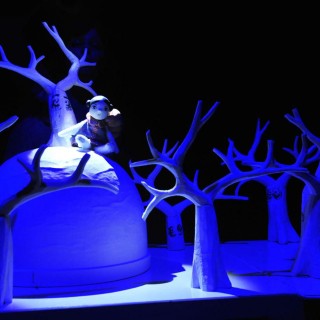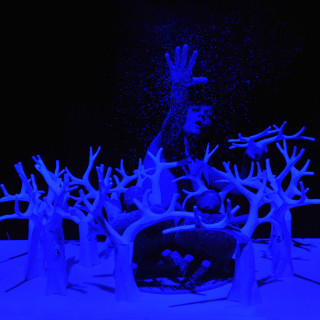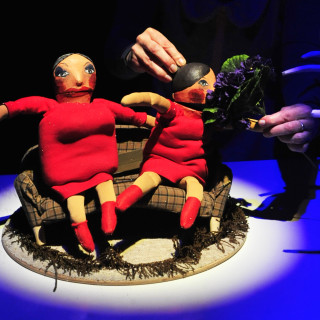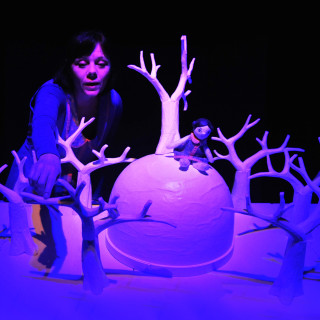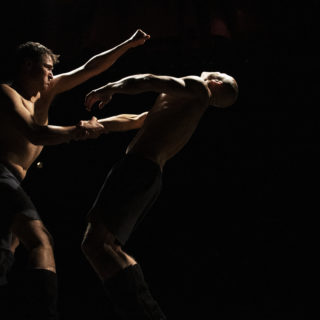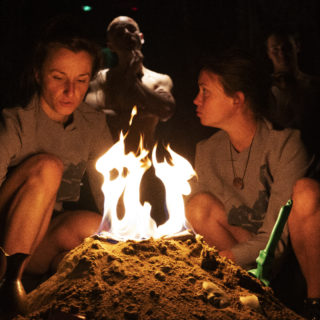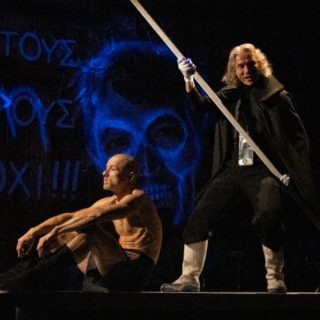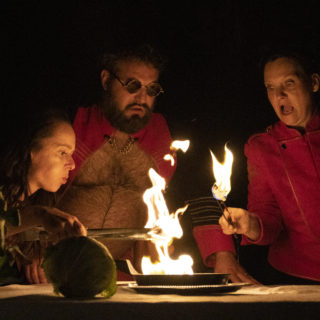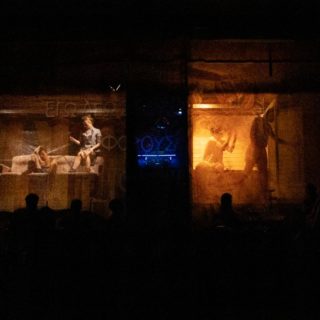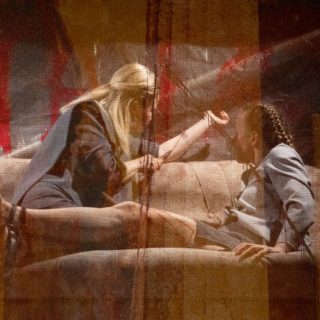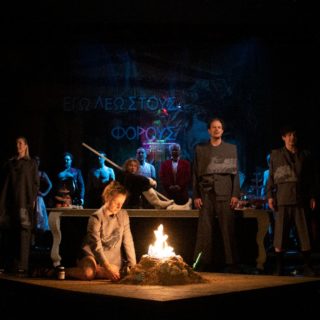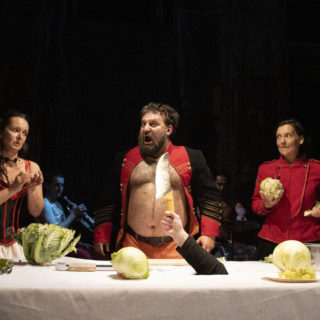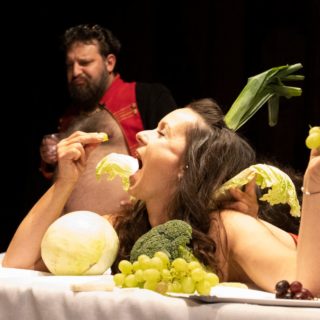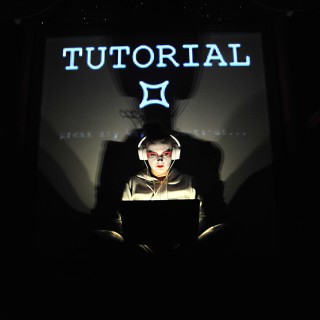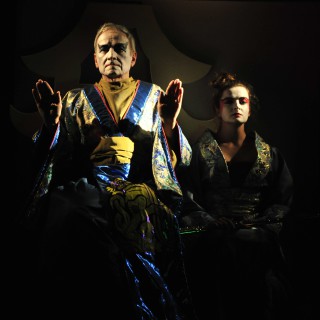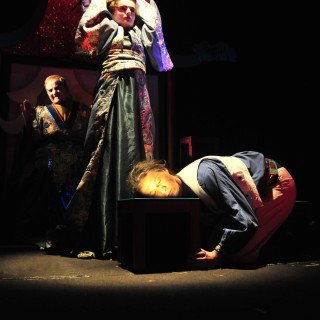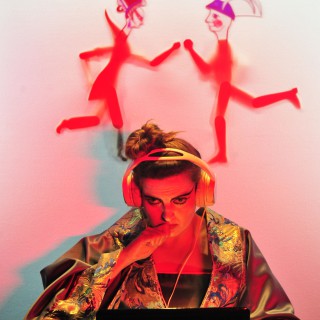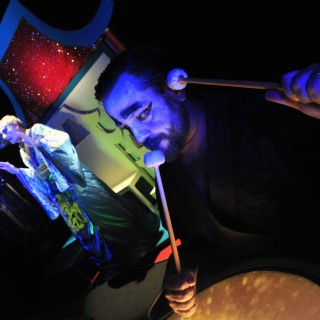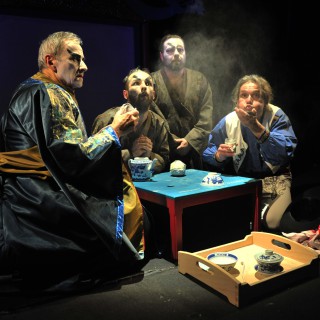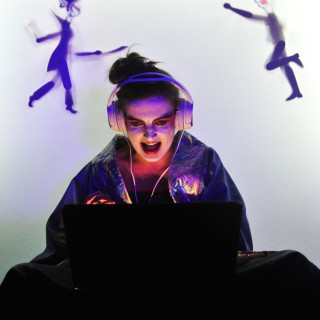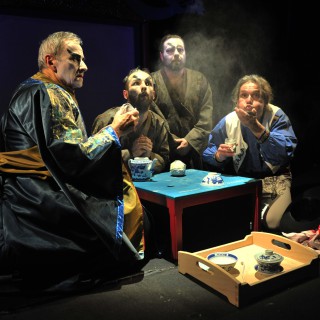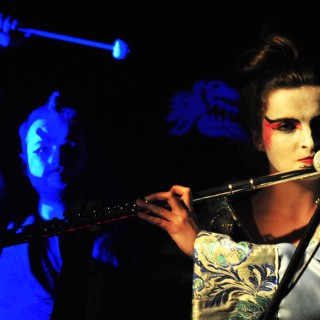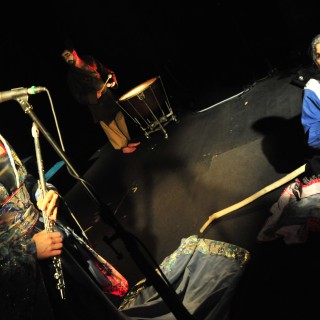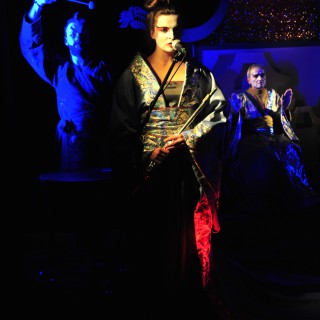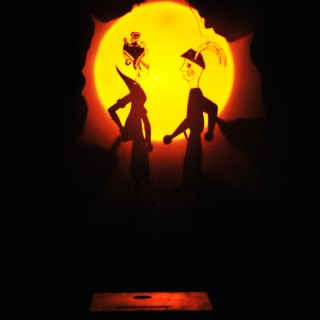The African Tale
Our new tale is a little different from what we used to see. That is because it comes of Africa – the land of beautiful and wild nature full of exotic creatures that we know only from a zoo. Africa is also the cradle of Africans that, similarly to us, relate their own tales and myths.
Our straightforward tale accompanied by rythmical rhymes and drumming doesn’t lack for the hero with his failings that leads him into danger. Just a sound story!
Play it
Which sound goes with which to make candy for the ears? Who to tell what and when? How great is the reward for those who listen carefully? Which of the keys opens the mysterious cube? And what (or who) is inside it?
Georges Méliès’ Last Trick
Divadlo Drak’s production is inspired by the remarkable life and work of the cinematic pioneer Georges Méliès. It takes us to the enticing setting of magicians, tricks and magic. The magic tricks that Méliés was the first to use in a film medium, in an unbelievably imaginative manner we might add, still have their artistic poetry today. And, above all, thera are many who have followed in his footsteps. Even death comes up short in Méliès’ world full of boundless imagination, since celluloid, illusion and fantasy are weapons that seem to be able to defeat even the Grim Reaper himself… Or can they? We will find out when the story of the fascinating life of the greatest film magician of all time ends. https://youtu.be/decgUXSLvks Awards: Theatre Newpaper’s Award for Dušan Hřebíček in category „The Best Actor of The Season“ and for Jiří Havelka and Marek Zákostelecký in category „Puppet Theatre“– Georges Meliés’s Last Trick ERIK Award for the “Best Puppet Performance of the Season” – Georges Meliés’s Last Trick Festival Spotkanie Toruń, Grand Prix in categories „The Best Actor, Director and Music“ – Georges Meliés’s Last Trick
R.U.R. 2.0
One hundred years ago, Karel Čapek, in his play R.U.R., played with the idea of a human invention similar to a biological machine, whose task is to replace human work. This is also where the name for the autonomous machine, the robot, found its way into all world languages. These days the idea of an artificially-created intelligence is not just a theme for sci-fi, but a real phenomenon, whose development is advancing faster and faster. At the same time, we are witnesses to how the character of human work is changing, a significant part of which looks like it will be expendable in the future. But if human work would be replaced entirely, what would be the effect on mankind itself? What would actually be left of humanity? Wouldn’t mankind lose one of the basic meanings of its existence?
It’s fascinating how many questions posed by Čapek a hundred years ago not only apply to our present day, but especially to the near future, in which the generation on which our production primarily focuses will grow up and live. R.U.R. 2.0 is not an interpretation of the original play, but plays out its central theme in brand new contexts. For this reason, we created a laboratory in Studio Drak Theatre, where you can witness a unique experiment. Its goal is nothing less than trying to bring Čapek’s robots back to life using means typical for Drak creativity, and to once again answer the questions posed in his work.
- foto Jiří N. Jelínek
- foto Jiří N. Jelínek
- foto Jiří N. Jelínek
- foto Jiří N. Jelínek
- foto Jiří N. Jelínek
- foto Jiří N. Jelínek
- foto Jiří N. Jelínek
- foto Jiří N. Jelínek
- foto Jiří N. Jelínek
Doctor Tarzan’s Marvellous Circus
Ladies and Gentlemen, step right up and visit our big top – you will see true wonders from the world of animals. This is because the renowned Doctor Tarzan has just come to your town. Doctor Tarzan, who discovered many absolutely uniqe specimens form the animal knigdom in the primeval forests of Sumatra, in the crags of Kamchatka and elsewhere. The skills these creatures display will také your breath away. No zoo in the world will show you as much as Doctor Tarzan’s marvellous circus! This performance for young and old will bring you the atmosphere of old-fashioned menageries and big tops. For children aged 4 and up.
The Expedition: My Love!
White Island is glowing. Lost in the middle of the Arctic Ocean, it gives off light, because nobody can see it. Right now, when I am sitting in Stockholm writing these lines, White Island is enveloped in a glow. Nobody can see it. But the island glows on. The production is based on the book The Expedition: A Love Story by the Swedish author Bea Uusma. It follows the trail of the three-member pioneering expedition of the engineer André from the year 1897, which unsuccessfully tried to conquer the North Pole with the use of a hot air balloon. This adventure story has been told many times over, including in the film The Flight of the Eagle, which was nominated for an Oscar. It is appearing for the first time, however, on a Czech stage. It contains the romantic spirit of exploration and discovery, the tragedy of a human fate that came to a premature end somewhere in the polar wilderness, unfulfilled true love and several humorous, slapstick moments related to the very plan of the expedition. Who would have thought to reach the North Pole in a balloon? The tragicomic nature of the story was the inspiration for the creators of the production, guest director Filip Homola and scenographer Robert Smolík, to create a concept based on the striking visuality combining elements of clownery with the imagery of puppet and object theatre that, combined with the dominant musical compositions, promise a suggestive theatrical experience. https://youtu.be/u7E1BvxKm3s Press: “The most imaginative and conceptually accurate, witty and, in its artistic ideas, uncommonly entertaining production of Expedition: My Love from guest director Filip Homola and stage designer Robert Smolík is complemented by the ubiquitous atmospheric music of Kora et le Mechanix and is characterised by very balanced performances by the actors.” Veronika Bednářová, reflex.cz, 16 March 2022 “Sensitivity is the defining element capturing the essence of the production. (…) Apart from the precisely created atmosphere, the puppet ensemble is handled just as sensitively. The wooden puppets and objects are the primary dominant features, while each prop acts as a readable placeholder – whether it is a pair of lovers, several versions of the hot-air balloon, the three main protagonists or even a polar bear. Not only did the Hradec Králove production of Expedition: My Love revive the memory of this event in a sensitive way, it enriched it with a charming image of the intoxicating power love can have, for which people are not only willing to go to the ends of the earth, but to give their very lives.” Veronika Holečková, 17 January 2023, divadelni-noviny.cz
- foto Milan Hajn
- foto Milan Hajn
- foto Milan Hajn
- foto Milan Hajn
- foto Milan Hajn
- foto Milan Hajn
- foto Milan Hajn
The Twelve Moons
Maruška lives in a small cottage with her stepmother and stepsister. They are not very nice to her at all. And worst of all is when they send poor Maruška out into the ice and snow to bring back some strawberries: “And don’t come back without them!” Whatever will poor Maruška do now? A blizzard is raging outside, everyone and their dogs are huddled inside, and now she has this silly, impossible chore. Everybody knows that strawberries don’t grow in January. Or have they all forgotten?
This production for younger children is also a solo opportunity for one of the most experienced members of the troupe. In her years in Drak Theatre Ivana Bílková has worked will most of the well-known directors that have passed through the theatre and made it what it is today. She has acted in the legendary productions of Josef Krofta (such as The Bartered Bride), while Jan Borna, Jakub Krofta, Jiří Vyšohlíd and Tomáš Dvořák have also cast her in their productions.
Antigone
This is not the subject of a Latin American soap opera or an endless series from a city periphery, but the fate of the young heroine of an ancient tragedy: her father murdered his own father, her grandfather, and slept with his mother. Hence with her own her mother. And therefore also with her grandmother. Her brothers kill each other, and one of the brothers is not allowed to be buried by her future father-in-law. And then her mother’s brother. Or her grandmother’s. Whichever. And it is not exactly easy with her sister, either. Or is her sister having problem with the herione? It’s hard to say… Oedipus complex, Psyche, Eros. Only the Xanax is not a Greek word, but it might as well be. Either way, walking up to the very threshold of adulthood with such a load on your back seems more like a Pyrrhic victory. What did she do to deserve it? Why could not she have been born into a normal family? Is there even a normal family?
The heroine would like to finally take her destiny into her own hands. But she is confronted with an absurd ban that brings back all the shadows of her family’s past. But why should she be the one to bear the weight of wrongs and misdeeds committed by someone else? It seems that in order to live a normal life at all, she has no choice but to fundamentally reassess her relationship to authority, to her parents, to those close to her, to the world and, ultimately, to herself.
Following the theatrical road-movie The Journey, devised reworking of the ancient myth based on the motives of Sophocles’ tragedy is the second of the new cycle of productions by the Drak Theatre aimed at teenage audiences. The production is co-produced by Městská divadla pražská
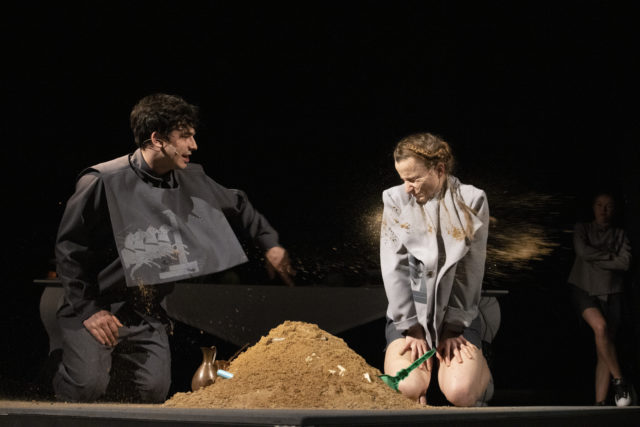
Foto Tomáš Roček
In the media:
“In the ‘theatre in a theatre’, Drak once again proves its greatest strength: a high standard of collective acting and musical versatility, the ability of instant animation, a feeling for timing and a sense of humour. The instructive production of suppressed gestures, high emotions, real fire and steam from the sauna of responsibility for yourself and the family in which one finds oneself, without being asked, has a great chance to reach its audience and ignite interest in both antiquity and in theatrical imagination. I hope so for the audience and for Drak.” Antigone has a chance to wow sensitive audiences, Petr Mareček, MF DNES, 21 May 2022 | rating 75%
“Antigone in DRAK is definitely not a literal adaptation of Sophocles’ play. The key situations are placed in a completely ordinary context that is close to us and thus the ancient heroes as performed by the individual actors appear completely authentic. Vašíček and Jarkovský have managed to find a theme in an ancient Greek myth tailored to their audience, to bring one of the oldest dramatic stories to the present day, all without losing that which makes ancient poetry so specific.” Veronika Švecová, Ancient teen dramedy, Puppeteer 2022-2
- Foto Tomáš Roček
- Foto Tomáš Roček
- Foto Tomáš Roček
- Foto Tomáš Roček
- Foto Tomáš Roček
- Foto Tomáš Roček
- Foto Tomáš Roček
- Foto Tomáš Roček
- Foto Tomáš Roček
Princess Turandot
Princess Turandot, the daughter of the Chinese Emperor, does not know what love is and does not want to get married under any circumstances. Thus she asks her father to ordain a cruel condition for all of her suitors. Whoever wants the hand of the princess has to guess three of her riddles otherwise he will lose his head. And the heads are rolling because Turandot is terribly clever. But is she wise, as well? And whatever will become of her meeting with the Czech lad Honza, who has also joined the ranks of her suitors and also therefore those who await an (almost) certain death?
Little Red Riding Hood
Once upon a time there was a little girl who wore a red bonnet on her head, and so everybody called her Little Red Riding Hood. One fine day she packed a basket full to bursting. Clothing, something to eat, a few trifles as keepsakes and her own story. Then she headed out on a trip to a completely foreign forest.
A Czech/Ukrainian production of the classic fairy tale than is well known by children and adults in both countries. There are two actors. Marina lives in Kyiv, Petr in Divec. Now they have come together in Hradec (which is not even close to being halfway) in order to tell the same story together. But Marina speaks Ukrainian and Petr Czech. And each knows that story a bit differently. It seems that if there is going to be a happy ending, they will have to learn how to make themselves understood.
